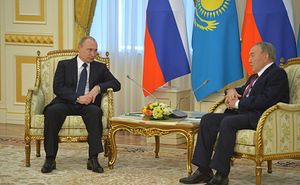Over the weekend, those following ethnic issues within Kazakhstan saw a new actor enter the fold. Alexei Venediktov, the nominally liberal head of the Moscow-based Echo Moskvy radio station, lobbed a few tweets that sent a buzz through the Kazakh Twitter-verse.
To be sure, Venediktov’s – and Echo Moskvy’s – liberal credentials have been called out at an increasing pace over the past few months, morphing what was once Russia’s “best independent radio station” into something altogether different. Venediktov’s Tweets over the weekend effectively flipped him from a neutral figure within Russian-Kazakh disputes into something approaching a nationalist stooge.
On Sunday, Venediktov pointed out to his half-million Twitter followers a bit about Kazakhstan’s impending Kazakh-language switch from the Cyrillic to the Latin alphabet: “Kazakhstan switches to Latin in 2025. And Northern Kazakhstan?” At first blush, Venediktov looks to be simply highlighting the impending shift, planned since at least 2012. But it doesn’t take much digging to find what he’s going for.
Northern Kazakhstan has seen unprecedented attention following Russia’s continued invasion in southern and eastern Ukraine, with parallels – ethno-linguistic Russian populations, minority rights, the Kremlin’s squishy understanding of nationality and sovereignty – continuing between the two. A recent report from International Crisis Group found a key quote from a Kazakh analyst: “[If] previously Kazakhstan perceived Russia as a big brother that will come to help when needed, now that perception has changed. Kazakhstan is very skeptical.” And rightly so. Russian President Vladimir Putin, just a few months ago, hinted darkly that Kazakhstan’s statehood stood directly under the rule of Kazakhstani President Nursultan Nazarbayev; any shift in leadership, therefore, may necessitate a change in the wholesale structure of Kazakhstan’s statehood.
Suffice it to say, the planned shift away from Cyrillic is yet another entry in the Kremlin’s potential list of grievances surrounding Kazakhstan’s ethnic Russian population (despite the fact that, since far fewer ethnic Russians speak Kazakh than the reverse, the Kazakh-language shift should have little discernible effect on Russian-language realities in the country.) This is the vein Venediktov seemed to tap over the weekend. As if his point wasn’t clear enough, a few Tweets augmented his line of thought. When one follower pointed out that there was no mass separatist sentiment in Kazakhstan, Venediktov responded, “Nor was there in Crimea, nor in Donetsk…” When another respondent noted that Kazakhstan was a unitary state, Venediktov replied, “And Ukraine is a unitary state.” As if his nationalist itch hadn’t yet been sufficiently scratched, Venediktov soon Tweeted a photo showing a decimated, apocalyptic Washington, D.C, with his caption, “Washington someday.”
Venediktov is by no means the first prominent Russian media personality to call for special treatment in northern Kazakhstan. A few months ago, the voices behind Sputnik i Pogrom declared northern Kazakhstan part of the “Russian nation-state.” Venediktov hasn’t gone so far as to call for the outright annexation of northern Kazakhstan, but his willingness to needlessly highlight apparent parallels between Ukraine and Kazakhstan is an inauspicious harbinger – and a sign of how quickly the discourse in Russia has shifted.

































